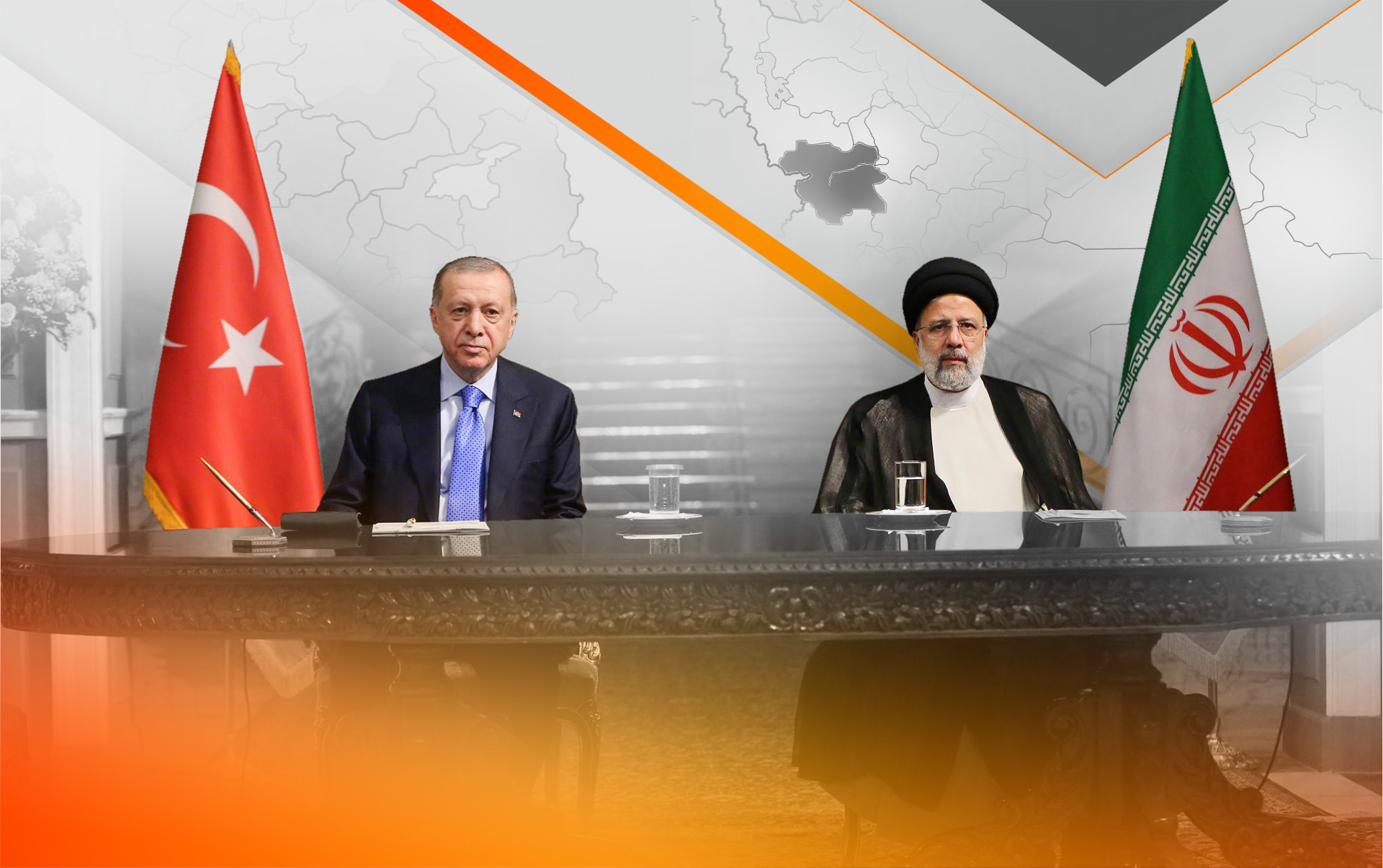Save for later
Introduction
For several weeks, the Kurdish question was again under the media spotlight and highly discussed within the diplomatic landscape. Overshadowed by the war in Ukraine, the combined Turkish-Iranian threats to invade Syrian and Iraqi Kurdistan(s) are forcing antagonistic actors of the international and regional systems to comprehend the situation, express their concerns and prepare for the various potential short-term scenarios.
Why is Iran now threatening to invade Iraqi Kurdistan? Can this threat indeed be implemented? Looking to Syria, will Turkey entirely occupy Syrian Kurdistan? Are the objective conditions favourable for "liquidating" the Kurdish administration in Syria this time? Is there an agreement between Ankara and Tehran to stop the rise of the Kurds in the Middle East? Does the new Middle East context allow for developing such a strategy for joint action? Do the recent trends in the transformation of the Iraqi and Syrian states – depriving them of their traditional conceptual frameworks – make it extremely difficult, not to say impossible, to deal with the Kurdish question?
This article puts into perspective these questions that force us to think differently. In a radically transformed Middle Eastern landscape, the old conceptual frameworks are rendered obsolete to decipher current trends.
Iran, a rogue state?
The death of Mahsa Amini, a 22-year-old Kurdish woman, on September 16 2022, after her arrest by the morality police, sparked a large-scale protest movement throughout the country. Iran accuses the Iranian Kurdish opposition, which has set up its base within the territory of the Iraqi Kurdistan Regional Government, of organising and directing the protest movement. Amongst the ranks of the opposition can be found, Komala and the Kurdistan Democratic Party of Iran (KDPI).
The Islamic Republic leaders’ narrative is perfectly illustrated by the Minister of Foreign Affairs, Hossein Amir Abdollahian. His narrative is designed to " start a civil war, " similar to what is happening in Syria, Yemen or Libya. Its ultimate goal is to "disintegrate Iran". This narrative ignores the entire political-economic structure of a regime challenged by a youth who aspires to a better world. Therefore, it is necessary to find an enemy who conspires with the help of international powers against the Islamic Regime. According to this narrative, this perceived enemy is eager, close, and all-powerful and lies just beyond Iran’s borders. These are the two Kurdish groups, the KDPI and Komala, supposedly instrumentalising Iraqi Kurdistan, preparing for a "civil war" to destroy Iran from within. The liquidation of this threat is becoming the utmost priority for the Iranian Regime.
It is within the confines of this narrative that the justification for an invasion of Iraqi Kurdistan takes shape. The Kurdish regional and Iraqi governments are incapable of controlling Komala, and the KDPI, the guardians of the Islamic Revolution, will thus have to step in to complete this objective. However, it must be noted that the objective conditions make this invasion unlikely.
First of all, the Islamic Republic of Iran is perceived by a large part of the international community (the United States of America, the European Union, the Arab countries, Israel, etc.) as a rogue state that systematically transgresses international treaties, does not respect basic human rights and behaves like an actor ostracised from the international community.
Moreover, Iraqi Kurdistan is today a federated entity and constitutionally recognised by the Iraqi State. The Kurds are no longer reduced to peshmergas in the mountains of Kurdistan; they now possess critical positions within the Iraqi government, such as the Presidency of the Iraqi Republic, the Ministry of Foreign Affairs, and the Deputy Prime Minister. Let us recall that Kurds occupy 20% of critical positions within the Iraqi state. For the international community, the Kurdish Regional Government is an essential political, economic and security partner within the Iraqi state. From Washington to Paris, the slogan adopted is: "We want a strong Kurdish Regional Government within a united Iraq."
Lastly, regarding the two Kurdish parties in Iran: the KDPI and Komala, none are internationally classified as terrorist organisations. Admittedly, they have military training bases and adopt armed struggle as a means to an end against the Islamic Republic. Still, it must be stated that these two groups have never instrumentalised the territory of the Kurdish Regional Government against Iran. On the contrary, Erbil has often enjoyed good relations with Tehran, thus often controlling, limiting and even sacrificing both these groups to maintain relations with Iran.
All these elements make it unlikely for the scenario of an Iranian invasion of Iraqi Kurdistan to occur. Nevertheless, it cannot be disregarded entirely, especially since Tehran has been putting growing pressure on both Erbil and Baghdad to achieve, at least partially, the objectives identified in this narrative.
Turkey, a critical state
Turkey, a crucial player since the war in Ukraine, occupies a position in the regional and international system that is radically different from Iran. A NATO member with excellent relations with Moscow, to which it pays for its gas purchases in roubles, and Kyiv, to which it sells its drones, Turkey is now where belligerents and critical players caught up in the Russian-Ukrainian conflict meet.
At the regional level, Turkey has normalised its relations with the Gulf countries and Israel. Regarding Marshal Sisi’s Egypt, normalisation is underway. In Iraq, together with the KRG, the Sunnis of Halboussi, Khanjar and the liberal Shiites, they form a significant pole of influence.
However, internally, President Recep Tayyip Erdoğan has never been so weak. The country’s economic situation is dramatic. The Turkish lira (TL) has lost "more than 28% of its value against the dollar since January 1. It had already lost 44% in 2021. The trade balance widened by 430% in October 2022. In the same month, inflation reached a quarter-century high of: 85.5% year-on-year, generating a surge in prices of 117% for transport, 99% for food and 85% for housing. These increases burden the lowest wages and precarious households by 126% to 146%. [1]”
This general economic crisis will undoubtedly be pinned on a president with a decisive electoral appointment next June. His goal is to make the impossible possible in the hope of winning these presidential elections. However, Recep Tayyip Erdoğan is aware that with such a financial track record, the probability of an electoral victory is very slim. He is thus forced to work a different angle for his campaign, namely national security.
At war with the Kurdistan Workers’ Party (PKK) for about 40 years, the President is preparing a new militarily intense confrontation, especially in Syrian Kurdistan, where the local branch of the PKK, the Kurdish Democratic Union Party (Partiya Yekîtiya Demokrat), runs an unrecognised state entity.
In January 2018, Turkey had already occupied the Kurdish region of Afrin, in northwestern Syria, despite the unanimous condemnations of the international community. Today, it targets the region of Kobane. Suppose it is true that the US demands Turkey not to put in full swing its invasion plan simultaneously. In that case, Washington confirms that Ankara has every right to protect itself against terrorist operations. For President Erdoğan, Washington’s position confirms that Turkey’s relations and influence are growing.
Capitalising on this whilst making this Kurdish issue work to his advantage could be highly profitable, enabling him to acquire popularity that should allow him to increase his chances for the June 2023 elections. President Erdoğan thus has two options. The first is to invade and occupy the Kobane region, and the second is to force the Kurds to accept the return of Bashar al-Assad’s authority over Syrian Kurdistan. The Russians, strongly present in Syria, favour the second option, and the Iranians have not yet decided.
In both cases, President Erdoğan will win. According to his calculations, an occupation of Kobane will be perceived by Turkish society as the victory of a Turkey led by a strong president that the country needs, capable of protecting the Nation, the territory and the State against the threats of "terrorists" organisations. Nevertheless, the return of Bashar al-Assad’s Regime to Syrian Kurdistan would also be profitable. Indeed, according to his calculations, this return definitely ends the existence of this Kurdish state entity. As a result, Erdoğan can also hope for a rise in voting intentions in the face of this eventuality.
Between invasion or return, the Turkish President wishes, as soon as possible, to find a solution for the few million Syrian refugees in Turkey. Indeed, this massive influx of Syrians in his country is now perceived as a failure emanating from his management of the Syrian file. Through invasion or return, he hopes to build safe zones and return these refugees, willingly or by force, to their country by June of next year.
Conclusion
To date, the armed forces of the two powers of the regional system are deployed on the two borders of Iraqi Kurdistan and Syrian Kurdistan. For Iran, the more the protest movement expands, the more it takes up the root, and the longer the protest movement lasts, the more it risks increasing the pressure exerted by Tehran on Baghdad and Erbil. However, the risk of a total or partial invasion is minimal. On the other hand, the closer Turkey gets to the June 2023 deadline, the greater the risk of a liquidation of the Kurdish state entity in Syria by an invasion or the return of Bashar al-Assad’s Regime becomes possible. Although strong in the face of the Islamic Republic of Iran, to which it regularly imposes sanctions, the international community seems helpless in the face of President Recep Tayyip Erdoğan.
Reference
[1] Nicolas Bourcier, "In Turkey, the economy on a dangerous slope", World, November 21, 2022.






